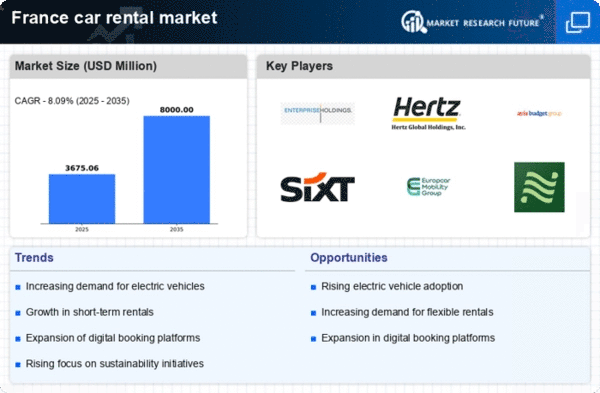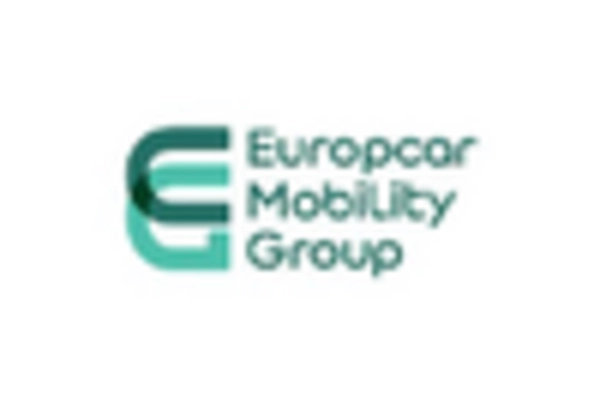Tourism Recovery
The car rental market in France is poised for growth due to the resurgence of tourism. France remains one of the most visited countries in the world, attracting millions of tourists annually. In 2025, the tourism sector is projected to contribute around €200 billion to the national economy, with a substantial portion allocated to transportation services. Tourists often prefer renting vehicles to explore the diverse landscapes and attractions, from the French Riviera to the Loire Valley. This trend indicates a potential increase in rental demand, particularly during peak seasons. The car rental market may see a 20% rise in bookings as international travel resumes and visitors seek the flexibility of self-driving options to enhance their travel experiences.
Increasing Urbanization
The trend of urbanization in France appears to be a significant driver for the car rental market. As more individuals migrate to urban areas, the demand for convenient transportation options rises. Urban centers, such as Paris and Lyon, are experiencing a surge in population density, leading to increased reliance on rental services. In 2025, urban areas account for approximately 80% of the total population, which suggests a growing need for flexible mobility solutions. The car rental market is likely to benefit from this trend, as residents may prefer renting vehicles for short-term use rather than owning them, given the high costs associated with urban living, including parking and maintenance. This shift could potentially lead to a 15% increase in rental transactions in metropolitan regions over the next few years.
Environmental Regulations
The car rental market in France is increasingly influenced by stringent environmental regulations aimed at reducing carbon emissions. The French government has implemented policies that encourage the adoption of low-emission vehicles, which could reshape the rental landscape. By 2025, it is anticipated that at least 30% of rental fleets will consist of hybrid or electric vehicles, aligning with national sustainability goals. This shift not only meets regulatory requirements but also appeals to environmentally conscious consumers. As a result, the car rental market may witness a 10% growth in demand for eco-friendly options, as customers seek to minimize their carbon footprint while enjoying the convenience of rental services.
Technological Advancements
Technological innovations are transforming the car rental market in France. The integration of advanced technologies, such as mobile applications and GPS tracking, enhances customer experience and operational efficiency. In 2025, approximately 60% of rental transactions are expected to occur through digital platforms, reflecting a shift towards online booking systems. This trend not only streamlines the rental process but also allows companies to manage their fleets more effectively. Furthermore, the adoption of contactless payment systems and digital key access is likely to attract tech-savvy consumers. As a result, the car rental market may experience a 25% increase in customer satisfaction ratings, leading to higher retention rates and repeat business.
Changing Consumer Preferences
The evolving preferences of consumers are driving changes in the car rental market in France. Younger generations, particularly millennials and Gen Z, are increasingly favoring access over ownership, leading to a rise in demand for rental services. This demographic shift suggests that consumers are more inclined to rent vehicles for specific occasions rather than committing to long-term ownership. In 2025, it is estimated that around 40% of rental customers will be under the age of 35, indicating a significant market segment. This trend may prompt rental companies to adapt their offerings, focusing on short-term rentals and tailored packages. Consequently, the car rental market could experience a 15% increase in revenue as it aligns with the preferences of this emerging consumer base.
















